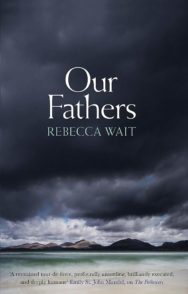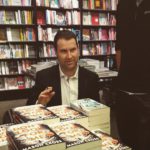‘Tom knew that he had not enjoyed that afternoon, or that morning, whichever it was, playing with Angus. He had thought of his mother the whole time, of how angry she must be, and worse, how hurt. Getting your own way, he had discovered, did not feel the way you expected it to. It made you lonely.’
Not all memories are happy ones and Rebecca Wait’s gripping yet tender novel, Our Fathers, explores the aftermath of a terrible family tragedy. In the novel, Tom witnesses his father shooting dead his mother, brother and baby sister. We catch up with him as adult, still reeling from his childhood, returning to his Hebridean home to visit his uncle to make sense of his father’s motivation.
Extract taken from Our Fathers
By Rebecca Wait
Published by Riverrun
Tom studied his uncle discreetly. Malcolm was wearing an old green apron, which had presumably belonged to Heather, and was stirring the sauce with frowning concentration. There was something incongruous about seeing his uncle dressed like this, brandishing a wooden spoon and making a dish which Tom associated with his mother. It seemed unmanly, though Tom realized what an absurd idea this was.
A feeling of shame came over him suddenly, a plunge of his stomach. And there was something behind it: a memory, he thought. Tom used to try to close down his thoughts in these moments, to prevent them bringing back anything he didn’t want to see, but often that made it more painful in the long run. It was better, he had learned, to be brave and to face up to the memory at once. So, deliberately, masochistically, he followed the threads of the feeling until he found the memory attached to it. The laundry one, as he thought of it. Back again. It was a straightforward event in itself: his mother had asked him to help put away the laundry and he had refused. Then, later, this had led to a row between his parents. It was the timing of the incident that gave it an unsettling significance, and Tom knew this was why it came back to him so regularly: it had taken place just a couple of days before the murders. And although as an adult Tom could see that the two probably weren’t connected, still a sense of horror infused the memory that was far disproportionate to its content.
He turned his eyes away from Malcolm and lived it again. He saw his mother standing by the sink, her hair loose. He was supposed to be going out to meet Angus to play. Tom had never been sure if the scene took place in the morning or afternoon, but he could feel the urgency of the meeting in his body, that tightness of anxiety – not that he was keeping Angus waiting, but something else, something vaguer, perhaps caught up with one of the deeper fears of his childhood – of missing out, of being left behind.
And his mother had said something like, ‘You’re not going anywhere until you’ve helped me put these clothes away.’
Tommy had believed he was going to do what she told him as he always did. He was surprised when he opened his mouth and said, ‘No.’ Then he felt the frisson in his whole body at having defied her.
He wasn’t sure exactly how his mother had responded, but he knew she had stood firm and, amazingly, he had too. He had hated her in that moment, and he remembered the shock of this feeling. ‘I have to go and meet Angus,’ he had told her, over and over, feeling himself a hero in his defiance. ‘He’s waiting for me.’ And then the bit he remembered most clearly, knowing as he said it that he was going too far, but saying it anyway: ‘Laundry is women’s work.’
He didn’t recall what his mother had said to that either. She had been furious, he was certain, but her words were lost. He was not sure why he had silenced her in so many of his memories.
Into this stand-off between them his father had entered. Tommy had felt a lurch of fear that was like falling, the certainty now that he had overplayed his hand. His father had looked to them both to explain the noise. He must have been in his study working.
They had told him, or perhaps Tommy’s mother had told him, reluctantly, maybe, in her quiet voice. Perhaps Tommy had chimed in shrilly in his own defence, saying that he didn’t have time, that Angus was waiting for him, or perhaps he had remained silent, fearful.
He remembered, though, how his father had responded. His father, standing in the kitchen doorway, doing that half-smile he sometimes did. He had said something like, ‘Katrina, the boy needs to be outside playing, not tied to his mother’s apron strings.’ Then he had turned to Tommy. ‘Off you go. We won’t let her turn you into a lass.’
And Tom remembered how he had slunk out, the mingled sense of satisfaction and betrayal, and how – he believed – his mother had not looked at him as he left. He felt the triumph at having defeated her and the horror of it, and caught up with it all was the warmth that flooded him when she turned her smile on him, how she would crouch down to listen to him when he was trying to tell her something, the feel of her as she hugged him and he slipped his arms around her middle and squeezed. Tommy adored no one as he adored his mother. He had confided in Nicky once, when they were very little, that he loved his mother even more than God and Jesus, and Nicky had told him, ‘You can’t say that,’ before adding comfortingly, ‘I do too.’
Tom knew that he had not enjoyed that afternoon, or that morning, whichever it was, playing with Angus. He had thought of his mother the whole time, of how angry she must be, and worse, how hurt. Getting your own way, he had discovered, did not feel the way you expected it to. It made you lonely.
Malcolm turned and said, ‘Almost done now,’ and Tom nodded and got up to lay the table.
Our Fathers by Rebecca Wait ublished by Riverrun, priced £14.99
ALSO IN THIS ISSUE

 Our Fathers
Our Fathers
‘Tom knew that he had not enjoyed that afternoon, or that morning, whichever it was, playing with An …

 The Book According to…Mark Douglas-Home
The Book According to…Mark Douglas-Home
‘“Have you,” he said after consideration, as if proposing a soloution “ever had a crazy, …













